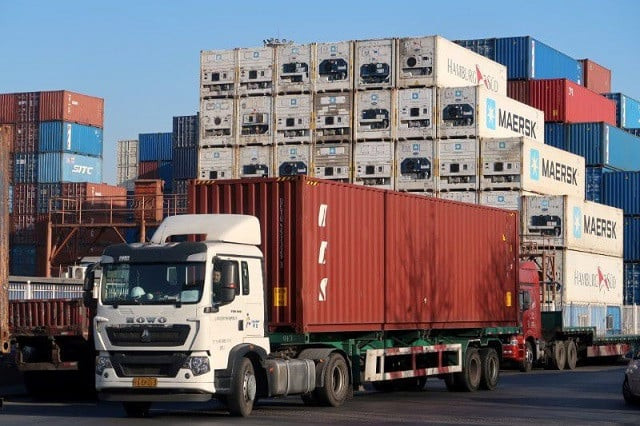Logistic companies struggle to achieve economic growth
Low margins, high taxes deter post-Covid business recovery

Logistic companies in Pakistan are grappling with low margins, high taxes, and an unfavourable business environment, hindering their ability to contribute to the overall economic growth of the country.
Seagold, CEO, Ayaz Admani highlighted the concerning decrease in average gross margins for Pakistani companies. In recent years, margins have plummeted from 3% to 3.5% to a mere 1% to 1.25% due to the economic meltdown. This significant drop coupled with high expenses, poses considerable difficulties for companies, especially when competing with global counterparts.
To sustain operations, Admani stressed the need to increase volumes, export more containers, and generate additional revenue. In an interview with The Express Tribune, he discussed the constraints faced by local companies in expanding internationally, citing the success of Sri Lankan logistics company EFL, which has established offices worldwide. Admani attributed the limited growth of Pakistani companies to high interest rates, inadequate investment in systems, and currency devaluation.
The taxation system, bureaucratic hurdles, and a lack of a business-friendly environment further impede the growth of logistics companies in Pakistan. Pakistan International Freight Forwarders Association (PIFFA), Chairman, Bilal Ur Rehman expressed concerns over the restrictive regime and taxation issues, making it challenging for businesses to invest and grow both domestically and internationally. He emphasised the need for policy reforms to support local companies and enable them to compete globally.
The entry of global companies into Pakistan could have significant positive impacts on the economy, including foreign direct investment, job creation, and opportunities for the logistics sector. However, the current growth rate in the logistics industry is considered low, and local companies struggle to avail themselves of opportunities due to various impediments.
During the interview, Admani also highlighted the need to modernise the trucking fleet in Pakistan, improve the business environment, and leverage conventions like the International Road Transport (TIR) to expand trade with neighbouring countries. In terms of the Covid-19 pandemic’s impact, Admani initially expressed concerns but decided to retain employees despite economic uncertainty. Fortunately, businesses experienced a surge in demand after a brief slump, leading to record sales and strong performance in various sectors, including logistics.
Admani noted the reduced demand in the economy, which has resulted in increased competition among companies vying for limited business opportunities. Although the devaluation of the Pakistani currency has had some positive effects on exports, particularly in sectors like rice, steel, pipes, and cement, the demand has not yet reached pre-pandemic levels, although it is gradually improving. He anticipated that as the effects of the Covid-19 pandemic subside, demand will likely rise further, although supply chain challenges persist.
When discussing margins, Admani highlighted the disparity between global logistics companies and their Pakistani counterparts. While global companies generate around 3.5% on their revenues, local companies typically generate less than 2.5%. This emphasises the need for local companies to improve their systems and invest more to increase profitability and competitiveness.
The PIFFA chairman provided insights into the number of logistics companies operating in Pakistan. PIFFA has an estimated membership of around 1,000 companies, while the total number of logistics companies, registered or not, could range from 2,000 to 3,000. Rehman also mentioned the challenges faced by smaller companies in meeting PIFFA’s registration requirements, which include income tax registration and certain office and staffing criteria.
The logistics industry in Pakistan is a significant job provider, employing around 150,000 to 175,000 individuals. On average, a company in the sector employs approximately 75 people. Despite initial concerns during the pandemic, companies like Seagold refrained from layoffs, and the subsequent surge in demand post-pandemic led to exceptional sales and business performance.
The logistics industry in Pakistan faces multiple challenges, including low margins, high taxes, regulatory constraints, and a less-than-favourable business environment. Addressing these hurdles through policy reforms, system investments, and improvements in the overall ecosystem is crucial for enabling the growth of local logistics companies and allowing them to compete globally. Overcoming these obstacles and fostering a supportive environment will unlock the potential of the logistics sector, stimulate economic growth, and create employment opportunities in Pakistan.
Published in The Express Tribune, July 5th, 2023.
Like Business on Facebook, follow @TribuneBiz on Twitter to stay informed and join in the conversation.



















COMMENTS
Comments are moderated and generally will be posted if they are on-topic and not abusive.
For more information, please see our Comments FAQ